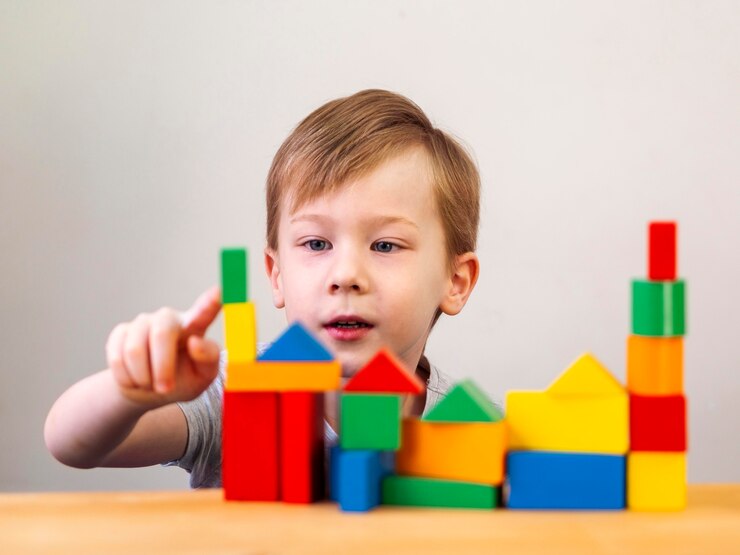Introduction
Language development is a crucial aspect of a toddler’s growth, impacting not only communication skills but also social interaction, emotional regulation, and cognitive abilities. While every child develops at their own pace, parents can play a significant role in nurturing language skills through everyday interactions and activities. In this blog, we’ll explore simple, effective strategies that parents can use to foster language development in toddlers, helping them build a strong foundation for future learning.
1. Talk, Talk, and Talk Some More
The simplest yet most effective way to encourage language development in toddlers is through regular conversation. Even before toddlers can fully respond, they absorb language by listening to those around them.
- Narrate Your Day: As you go about your daily activities, narrate what you are doing. For example, while preparing a meal, say, “I’m cutting the apples into slices,” or “Now I’m stirring the soup.” This introduces your toddler to new vocabulary in context, helping them connect words to actions.
- Label Everything: Point out and label objects, people, and actions in your environment. For instance, when walking outside, you might say, “Look, there’s a red car,” or “That bird is flying high in the sky.” Consistently labeling things helps toddlers expand their vocabulary and improve word association.
- Use Open-Ended Questions: Instead of asking questions that require a yes or no answer, try open-ended questions that encourage your toddler to use more language. For example, ask, “What did you play with today?” or “How did you make that tower?” These questions promote more complex speech and allow toddlers to practice forming sentences.
2. Read Together Every Day
Reading aloud to your toddler is one of the most impactful ways to boost language development. Books expose toddlers to a wide range of vocabulary and sentence structures that they might not encounter in daily conversation.
- Choose Age-Appropriate Books: For toddlers, picture books with simple, repetitive text and engaging images are ideal. Books with rhymes, songs, or interactive elements can keep your toddler’s attention while reinforcing language patterns.
- Engage Your Toddler in the Story: As you read, pause to ask questions about the story or illustrations. For example, “What do you think will happen next?” or “Can you find the cat on this page?” Engaging your child in this way encourages active listening and language use.
- Repetition is Key: Toddlers often enjoy hearing the same story over and over. While this may seem repetitive to parents, it helps toddlers become familiar with words, phrases, and sentence structures. Repeated exposure to the same vocabulary strengthens their understanding and recall.
3. Encourage Imitation and Pretend Play
Toddlers love to imitate adults, and pretend play offers them the perfect opportunity to practice new words and phrases. By encouraging imitation and role-playing, parents can help toddlers expand their language skills.
- Play Pretend Games: Create scenarios where your toddler can pretend to be a doctor, chef, teacher, or any other role. During pretend play, introduce new words that fit the theme, like “stethoscope” during a doctor game or “ingredients” while cooking. Role-playing helps toddlers practice new vocabulary in a fun, engaging way.
- Imitate Sounds and Words: Encourage your toddler to imitate the sounds they hear around them. For example, say, “Can you make the sound of a car? Vroom, vroom!” Imitation allows toddlers to practice making different sounds and word patterns, which are essential for language development.
4. Sing Songs and Nursery Rhymes
Music and language are closely connected, and singing songs or reciting nursery rhymes is an excellent way to enhance a toddler’s language development. Songs introduce toddlers to the rhythm and melody of speech while making language learning fun.
- Sing Daily: Incorporate songs and nursery rhymes into your daily routine. Songs with repetition, such as “Twinkle, Twinkle, Little Star” or “The Wheels on the Bus,” help toddlers learn new words and practice memory recall. Toddlers often pick up words faster when they are set to music.
- Add Actions to Songs: Songs that include actions, like “Head, Shoulders, Knees, and Toes,” help toddlers connect language with movement. Acting out the words reinforces their meaning and makes learning more interactive.
- Make Up Your Own Songs: If your toddler enjoys singing, create your own songs about daily activities, like getting dressed or brushing teeth. Personalizing the song can make language learning even more relevant and fun.
5. Give Time for Responses and Conversations
Toddlers may take longer to process language and respond during conversations. Giving them enough time to gather their thoughts and express themselves is crucial for developing communication skills.
- Pause and Wait: After asking a question or making a comment, pause for a few seconds to give your toddler a chance to respond. Rushing to fill the silence can hinder their ability to practice forming words and sentences.
- Acknowledge Their Efforts: When your toddler attempts to communicate, whether through words or gestures, acknowledge and respond to their efforts. Even if they only say part of a word or phrase, repeat it back to them correctly to reinforce proper usage. For example, if they say, “wa-wa” for water, you can respond, “Yes, you want water!”
- Be Patient and Encouraging: Language learning can be frustrating for toddlers who are still developing the ability to express themselves clearly. Show patience and offer encouragement to build their confidence. Celebrate their successes, even if they are small, to motivate them to keep trying.
Conclusion
Language development in toddlers is a gradual process that parents can support through daily interactions, play, and activities. By talking frequently, reading together, encouraging pretend play, singing songs, and giving toddlers time to respond, parents can create a language-rich environment that fosters growth. Each word and sentence your toddler learns is a step toward becoming a confident communicator. Keep these simple strategies in mind to help your toddler reach important language milestones while having fun along the way.


2 thoughts on “Fostering Language Development in Toddlers: Simple Strategies for Parents”